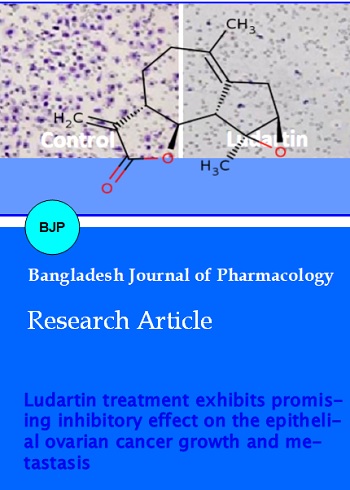Ludartin treatment exhibits promising inhibitory effect on the epithelial ovarian cancer growth and metastasis
DOI:
https://doi.org/10.3329/bjp.v11i3.26692Keywords:
Growth, Ludartin, Metastasis, Ovarian cancerAbstract
In the present study, the effect of ludartin on OVCAR5 ovarian carcinoma cells was investigated. MTT cell assay was used for the analysis of cell viability and wound healing assay for migration potential. Results revealed that ludartin treatment at 10 and 30 µM doses reduced the cell viability from 94 to 38%. The invasive potential was decreased from 62 to 24% with increase in ludartin concentration from 10 to 30 µM. Western blot analysis showed that ludartin treatment reduced the expression of p-FAK in OVCAR5 cells significantly. Ludartin treatment for 48 hours also caused a significant decrease in the expression of MMP-2 and MMP-9 in OVCAR5 cells at a concentration of 30 µM. The metastatic regions were absent in the rats treated with 30 µM/kg doses of ludartin daily for 15 days. Thus, ludartin treatment inhibits the proliferation, invasion and migration of ovarian cancer cells through down-regulation of pFAK and MMPs, therefore can be used for the treatment of ovarian cancer.
Video Clip of Methodology:
Cell proliferation assay: 2 min 45 sec Click to watch
Downloads
459
229 Read
114 Feature
142

Published
How to Cite
Issue
Section
License
Authors who publish with this journal agree to the following terms:
- Authors retain copyright and grant the journal right of first publication with the work simultaneously licensed under a Creative Commons Attribution License that allows others to share the work with an acknowledgement of the work's authorship and initial publication in this journal.
- Authors are able to enter into separate, additional contractual arrangements for the non-exclusive distribution of the journal's published version of the work (e.g., post it to an institutional repository or publish it in a book), with an acknowledgement of its initial publication in this journal.
- Authors are permitted and encouraged to post their work online (e.g., in institutional repositories or on their website) prior to and during the submission process, as it can lead to productive exchanges, as well as earlier and greater citation of published work (See The Effect of Open Access).
